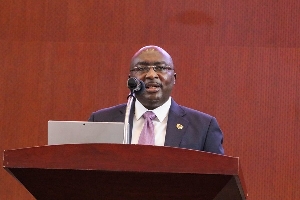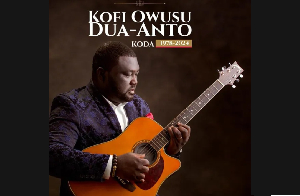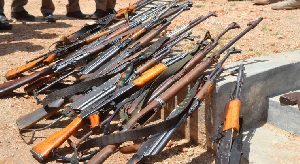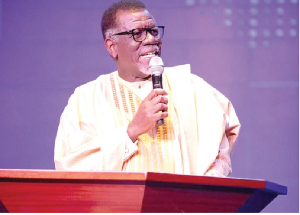Opinions of Friday, 21 May 2004
Columnist: GNA
Looking Down The Quatari Corridor
A GNA Feature by Ms Beatrice Akua Asamani
Accra, May 20, GNA - At about 2030 hours, some three hours ahead of Ghana's time on Monday, May 10, Vice President Aliu Mahama arrived at the Doha International Airport with a Government Delegation, for a three-day State visit, which was at the invitation of the Heir Apparent to the Qatari Throne, Sheikh Jassim Bin Hamad Al-Thani.
When the plane touched down, an assortment of luxury cars, mostly Mercedes, were waiting to pick the delegation from the Airport, which had hoisted Ghana's flag alongside their nine-pointed serrated maroon flag combined with a broad white band.
One of the 17 Cabinet Ministers, Sultan Bin Hassan Al Dousari, Minister of Municipal Affairs and Agriculture, led the welcoming party, which included Dr Abdul Razak Mahadeen Hassan Tahir, Ghana's Ambassador to Saudi Arabia, who has oversight responsibility of Qatar.
By the time the delegation reached the magnificent Sheraton Hotel, one of the five star international hotels in Qatar, that was to be their residency, the members had already been captivated by the beauty of Qatar and were eager to know what it could offer to their motherland.
The delegation of the Vice President included the Deputy Minister of Foreign Affairs, Akwasi Osei-Adjei; Deputy Minister of Trade, Industry and President's Special Initiatives, Hajia Alima Mahama; Chief Executive Officer of the Ghana Investment Promotion Centre (GIPC), Mr Kwasi Abeasi some businessmen and Foreign Ministry Officials and Journalists.
Indeed, the gorgeous blend of well-planned modern and ancient architecture greeting the lighted skies and the beautiful greenery landscape overlooking the sea clearly demonstrated Qatar's desire to be recognised as "a country with a rich past and an ambitious future."
The Geography of Qatar
The State of Qatar is located mid-way along the west coast of the Arabian Gulf bordering Saudi Arabia. The mainly flat peninsula, which consists of rocky surfaces, some sand hills and dunes, cover a total land area of 11,521 square kilometres (slightly larger than the Central Region). The coastline is 563 kilometres long. The country has a desert climate of hot summer and relatively warm winter with temperatures ranging between 25 degrees Celsius and 46 degrees Celsius.The people of Qatar, called Qatari(s), are said to be descendants of Arabian lines of kinship. The population was formed by a major migration, which occurred in different times between 17th and 18th centuries. In July 2003, the population, which is resident in 10 administrative municipalities, was estimated to be 817,052. However, about 80 per cent are resident in the capital, Doha. The population consists of 40 per cent Arab; 18per cent Pakistani; 18 per cent Indians, 10 per cent Iranian with others making up 10 per cent. At present, there are 43 Ghanaian residents, including eight children in that country. The language of the people, 95per cent of whom are Muslims, is Arabic. However, English is widely spoken as a second language.
The Government of Qatar
The King, who is from the Al-Thani Family, is the Head of State of Qatar. The Emir wields the power to appoint his son as his successor and in the situation where he has none, he chooses an heir in the Al-Thani Family. He appoints the Prime Minister, who is currently his first son and the Deputy, his second son. The Emir is assisted by a Council of Ministers (Cabinet) and Advisory Council, (Unicameral-Parliament), two-thirds of whom are elected, to promulgate policies and legislations for the State, which gained independence from Britain on 3rd September 1971. There are no political parties and Sharia is the main source of legislation.
The Economy of Qatar
On the second day of the visit, which was essentially to seek for investment, Vice President Mahama went to the Qatari seat of Government, the majestic granite building, called the Diwan Amiri, where he held fruitful discussions with the Emir, Sheikh Hamad Bin Khalifa Al-Thani, who became the eight ruler of Qatar in 1995.The discussions focused on strengthening bilateral ties between Ghana and Qatar with special focus on trade and investments as well as promoting cultural and technical cooperation. The Heir Apparent and third son of the Emir, Sheikh Jassim, the Vice President's host, was also at the meeting, together with Qatari Ministers of Economy and Trade, Foreign Affairs, Municipal Affairs and Agriculture and others. Ghana's Deputy Foreign Affairs Minister, Mr Akwasi Osei-Adjei and other officials were also present.
The Emir, who knows Ghana as the home of Abedi Pele, who played professional soccer for his team, displayed a deep knowledge about Ghana to the astonishment of his guests.
At the end of the meeting, Qatar and Ghana agreed to establish trade and investments relationship under, which the oil-rich country would assist Ghana, mainly through the private-sector, to explore natural gas and oil and to develop its petrochemical industry.. Qatar also agreed to assist Ghana's salt mining industry. The meeting also pledged to work towards promoting friendly inter-club soccer matches as both countries have a deep passion for football.
Four agreements were later signed at the imposing Ministry of Foreign Affairs to formalise the discussions. Mr Osei-Adjei and the Qatari Minister of State for Foreign Affairs, Ahmed Bin Abdullah Al Mahmoud signed two of the agreements, which formed the framework for the establishment of a Permanent Joint Commission and stronger governmental cooperation.
The President of the Ghana Chamber of Commerce, Mr Solomon Abam Quartey signed the other two agreements for the establishment of a Joint Business Council and cooperation with the Qatar Chamber of Commerce and Industry. Mr Muhammad Bin Twar Al Kawari signed for his side.
It is very critical to follow-up on these agreements to marry the economies of the two countries, which have different resources for exchange, for their mutual benefit.
Qatar's rich experiences in the petrochemical industry and salt mining sector would be of immense benefit to Ghana, which is seeking assistance to unearth and develop natural gas reserves believed to exist in the Cape Three Point area in the Western Region, the Tano Basin and other parts of the country. Qatar can also depend on Ghana's agrarian economy to satisfy its deficiency in agriculture.
Oil and gas is the backbone of Qatar's economy, accounting for more than 55% of the country's GDP. It has proven natural gas reserves exceeding 17.9 trillion cubic metres, more than five per cent of the world's total, thus making it the third largest in the world.
It is also endowed with proven oil reserves of 14.5 billion barrels. The country's per capita income is reported to be nearly as much as that of leading industrial countries in Western Europe. In 2002, the GDP (per -capita purchasing power parity) was estimated to be 15.91 billion dollars. The per capita income, which is about 25,000 dollars now, is expected to shoot up to about 50,000 dollars in the next two years, when the economy is expected to optimise its earnings from increased natural gas exports.
In 2003, the country's budget revenue was five billion dollars, while expenditures amounted to 5.5 billion dollars with nearly half of the amount in capital expenditures. The currency, the Qatari Riyal is 3.65 to the dollar, while the inflation rate is about 1.9 per cent.
Industrial activities in Qatar are mainly related to oil and gas production and refining and the production of petrochemicals. However, fertilizers, steel reinforcing bars and cement manufacturing are also thriving industries. With no waterways and an arable land of just 1.27 per cent, the agricultural sector, which receives a lot of State subsidy, accounts for only 0.4 per cent of GDP. Products include fruits, vegetables, fish, beef, poultry and dairy products.
Qatar's export commodities are petroleum products, steel and fertilisers and in 2002 they fetched about 10.9 billion dollars from Japan, South Korea, Singapore and the United States. In the same year, imports of machinery and transport equipment, food and chemicals was about 3.9 billion dollars. The commodities were from France, Japan, UK, Italy and other countries.
With such a solid economy, the State is able to provide attractive social welfare schemes to ensure that all the citizenry enjoy good quality life. The benevolence is also extended to the needy in less endowed countries as was shown in the commitment of the Minister of Endowments and Religious Affairs, Ahmed Abdulla Qurab to sponsor education, health, water and income generating activities for rural communities in Ghana, upon receipt of specific project proposals with costs, when he met Vice President Mahama.
In Qatar, Education is provided at no cost to the highest level while medical care, electricity and water are also free. The State also provides popular housing facilities for citizens with limited income, the aged, the handicapped, widows and orphans. Huge investments (over one billion dollars) were made recently to support a housing project for senior government staffs.
The State also pays special allowances to the poor, widows, divorcees, the handicapped, the aged and orphans to ensure that nobody lives below the poverty line, while men who need assistance are financially cushioned to pay their dowries.
Women, who are in the minority, are gradually being allowed to participate in mainstream political and economic activities with a right to stand and vote in elections. The lowest income earner receives about 2,000 dollars monthly in Qatar, while an average family owns at least one land cruiser. In fact, brand new cars appear to outnumber the population in Doha.
Additionally, the State continuously invests in the modernisation of road, airport, seaport, telecommunications and other infrastructure to meet international and top class standards.
There are four airports and three seaports, while 1,107 km of the 1,230km highway network is paved. One of the most outstanding feats in Qatar is the construction of a unique Education City, which would be linked for teaching and learning with the 10 top universities in the world. The buildings were designed and constructed by the best in their fields from different parts of the world. They are also equipped with the State of Art Technology, logistics, teaching and learning aids to train professionals in engineering, the media, administration, law, ICT and others.
Dr Saif Ali Al Hajari, Deputy Board Chairman of Qatar Foundation for Education, Science and Community Development, conducted the Vice President and his delegation round the Virginia Commonwealth Faculty of Arts and Design and the Weill Cornell Medical College.
The wife of the King, Sheikha Mozah Bint Nazir Al-Misnad, the brain behind the project, chairs the Board. The exhibits, including handicrafts, dresses and packaging materials, which were displayed in the corridors of the Arts Faculty, deeply demonstrated an awesome array of creativity induced by the best environment. The students are aged between three years and 18 years.
To ensure the sustainability of the school, a one billion-dollar endowment fund has been established and invested to fund the activities of the Education City. It would be fully completed in 2007 and it is open to students from all over the world. At present, there is only one African student, who is from Nigeria.
In spite of a highly successful self-reliant economy, the Qatari Government seeks foreign direct investments to diversify its economy through the private sector. Consequently it provides a wide range of incentives in the form of tax holidays, exemptions from import and custom duties, the provision of petrochemical products and electricity at nominal fees as well as land, leased for long-term periods at moderate rent to investors.
Qatari businessmen told the Ghana News Agency that they are searching for safe destinations to invest their wealth. It is in this light that the Heir Apparent of Qatar, Sheikh Jassim, opened the corridors of his country to Vice President Mahama and his business delegation to take a tour that would lead to the strengthening of bilateral ties and the establishment of trade; investments; cultural and sporting links.
Qatari businessmen expressed their strong desire at a joint business forum to visit Ghana and assess its opportunities and challenges for cooperation. Their main concern is that the safety of their investments should be guaranteed.
It is quite a privilege to enter Qatar in view of the strong immigration control measures that ensure that nobody enters the country as an illegal immigrant.
"The doors have been opened and from here we need to work things out for our common interest," Foreign Affairs Minister Ahmed Mahmoud, aptly said of the visit, when he signed the cooperation agreements.












